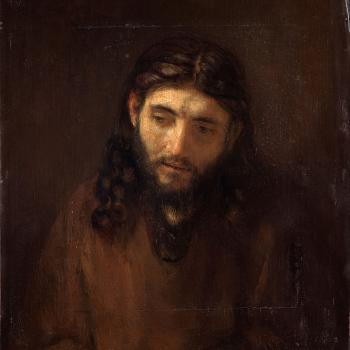
Foreknowledge and determination are two different things. I have a pretty good knowledge that the sun will rise tomorrow, but I don’t cause it. I am pretty sure that my three sons will rise out of bed tomorrow, and that they will play outside if it is nice. But I don’t cause that. So God knowing, in His omniscience, how we will respond to His grace does not determine our response. He simply knows the response we will make (being out of time) to that which was necessary for us to act either way (either accepting or rejecting His grace).
Let me give an example. If I have a hose and squirt someone with cold water, the result is that they will get wet. But the response of their body to the applied water will differ according to temperature and other weather conditions (such as wind, humidity and cloudiness or sunniness). So the hose and the water it squirts causes wetness, but it also brings about differential effects, according to weather. So on a very hot humid, sunny day, it feels rather good and not particularly “cold” or uncomfortable at all (especially in a bathing suit, etc.). On a 50-degree cloudy, windy day, the result is rather different. Yet the same hose and same-temperature water caused both. That is how God’s grace is with us. If we respond positively and favorably, the grace still caused it, not us. God determines the precipitating cause, but not the final effect and reaction to the cause (grace).
***
However we act, God knows already that course of action that we took instead of another. That’s what middle knowledge is all about. We see this knowledge of God clearly in the Bible, from our Lord Jesus’ own words:
Woe to you, Chorazin! woe to you, Bethsaida! for if the mighty works done in you had been done in Tyre and Sidon, they would have repented long ago in sackcloth and ashes . . . And you Capernaum, will you be exalted to heaven? You shall be brought down to Hades. For if the mighty works done in you had been done in Sodom, it would have remained until this day. (Mt 11:21,23; RSV)
St. Thomas Aquinas, in his Summa Theologica, I. 14.13. Answer, wrote:
And although contingent things become actual successively, nevertheless God knows contingent things not successively, as they are in their own being, as we do, but simultaneously . . . His glance is carried from eternity over all things as they are in their presentness. Hence it is manifest that contingent things are infallibly known by God, since they are subject to the divine sight in their presentness; yet they are future contingent things in relation to their own causes.
***
One could say, of course, that God — in some sense — caused every event in the universe (as Prime Mover or Ultimate, First Cause), by creating the physical universe and its laws in the first place. That’s a given, and a no-brainer. But we also talk of secondary causes: gravity causes me to break a bone when I fall 40 feet from a tree, etc. Did God cause that? Well, yes, insofar as He created a universe where gravity was normative. Did I cause it? Yes, by climbing the tree, and not providing a net or deep pool under it. Did gravity cause it? Yes. Did wind cause it? Yes, by blowing me out of the tree, thus subjecting me to the law of gravity and the hardness of the ground, etc.
***
We will do something if it is part of God’s knowledge. That is obvious, and as such, is of no interest to discuss in and of itself. But we will do it in actuality (as a free choice), which is a different proposition from having to necessarily do it, and not being free to do another. Thus God can know about the future without denying our freedom, and absolutely causing everything we do, so that we are not free agents.
***
If God is in time, then He is subservient to His creation, which is a nonsensical notion. If time is some eternal element (perhaps a contradiction in terms itself), then that would mean there is an uncreated eternal reality besides God. That is fatal to God’s transcendence to all creation. Even modern Big Bang cosmology has determined that time as we know it began at a certain point.
***
Catholic Encyclopedia, 1910, “God: Nature and Attributes” / “Divine Knowledge”
Distinctions in the Divine Knowledge. . . That God knows infallibly and from eternity what, for example, a certain man, in the exercise of free will, will do or actually does in any given circumstances, and what he might or would actually have done in different circumstances is beyond doubt — being a corollary from the eternal actuality of Divine knowledge. So to speak, God has not to wait on the contingent and temporal event of the man’s free choice to know what the latter’s action will be; He knows it from eternity. But the difficulty is: how, from our finite point of view, to interpret and explain the mysterious manner of God’s knowledge of such events without at the same time sacrificing the free will of the creature.
The Dominican school has defended the view that the distinction between knowledge of “vision” and of “simple intelligence” is the only one we need or ought to employ in our effort to conceive and describe Divine omniscience, even in relation to the free acts of intelligent creatures. These acts, if they ever take place, are known or foreknown by God as if they were eternally actual — and this is admitted by all; otherwise they remain in the category of the merely possible — and this is what the Jesuit school denies, pointing for example to statements such as that of Christ regarding the people of Tyre and Sidon, who would have done penance had they received the same graces as the Jews (Matt., xi, 21). This school therefore maintains that to the actual as such and the purely possible we must add another category of objects: hypothetical facts that may never become actual, but would become actual were certain conditions realized. The hypothetical truth of such facts, it is rightly contended, is more than mere possibility, yet less than actuality; and since God knows such facts in their hypothetical character there is good reason for introducing a distinction to cover them — and this is the scientia media . . .
first, it is possible Peter would do so and so; second, Peter would do so and so, given certain conditions; third, Peter will do or does so and so.
. . . The Dominican contention is that God’s knowledge of future free acts depends on the decrees of His free will which predetermine their actuality by means of the praemotio physica. God knows, for example, that Peter will do so and so, because He has decreed from eternity so to move Peter’s free will that the latter will infallibly, although freely, cooperate with, or consent to, the Divine premotion. In the case of good acts there is a physical and intrinsic connection between the motion given by God and the consent of Peter’s will, while as regards morally bad acts, the immorality as such — which is a privation and not a positive entity — comes entirely from the created will.
The principal difficulties against this view are that in the first place it seems to do away with human free will, and in the next place to make God responsible for sin. Both consequences of course are denied by those who uphold it, but, making all due allowance for the mystery which shrouds the subject, it is difficult to see how the denial of free will is not logically involved in the theory of the praemotio physica, how the will can be said to consent freely to a motion which is conceived as predetermining consent; such explanations as are offered merely amount to the assertion that, after all, the human will is free. The other difficulty consists in the twofold fact that God is represented as giving the praemotio physica in the natural order for the act of will by which the sinner embraces evil, and that He withholds the supernatural praemotio or efficacious grace which is essentially required for the performance of a salutary act. The Jesuit school, on the other hand — with whom probably a majority of independent theologians agree — using the scientia media maintains that we ought to conceive God’s knowledge of future free acts not as being dependent and consequent upon decrees of His will, but in its character as hypothetical knowledge or being antecedent to them. God knows in the scientia media what Peter would do if in given circumstances he were to receive a certain aid, and this before any absolute decree to give that aid is supposed. Thus there is no predetermination by the Divine of what the human will freely chooses; it is not because God foreknows (having foredecreed) a certain free act that that act takes place, but God foreknows it in the first instance because as a matter of fact it is going to take place; He knows it as a hypothetical objective fact before it becomes an object of the scientia visionis — or rather this is how, in order to safeguard human liberty, we must conceive Him as knowing it. It was thus, for example, that Christ knew what would have been the results of His ministry among the people of Tyre and Sidon. But one must be careful to avoid implying that God’s knowledge is in any way dependent on creatures, as if He had, so to speak, to await the actual event in time before knowing infallibly what a free creature may choose to do. From eternity He knows, but does not predetermine the creature’s choice . . .
***
The world may have had many different outcomes of fact. But in fact it has and will have one: that set of events which actually occurred, are occurring, and will occur. The point of middle knowledge with regard to soteriology is that God decrees and elects individuals in part based on His knowledge of what they will do with his absolutely free, unmerited grace, in the particular circumstance in which they receive it. All facts and actualities are already there in God’s knowledge, like characters’ actions in a novel are already in the author’s mind before the characters perform them. God is not limited in knowledge according to what we do. He doesn’t sit and wait to see what we do in order to know it. He already knows because He is out of time and knows all things, even hypotheticals and potentialities.
***
The notion that God is temporal and inside time is heresy. The 4th Lateran Council in 1215 declared the binding dogmas of God’s immutability and eternity. No Catholic can disbelieve that (it is de fide dogma — the highest level). To my knowledge, all the classic Protestant creeds and confessions would agree with this (and Eastern Orthodoxy). Thus it is the overwhelming Christian consensus, not just a Catholic doctrine. My Calvinist Christian brothers and I are in full agreement on this. God’s eternity is de fide Catholic doctrine, according to Catholic theologian Ludwig Ott, in his widely-used Fundamentals of Catholic Dogma. It is taught in Lateran IV and is also mentioned in Vatican I:
. . . one true and living God, Creator and Lord of heaven and earth, almighty, eternal, immense, incomprehensible, infinite in intelligence, in will and in all perfection [that would sort of rule out ignorance of the “future” and inability to control it in His sovereignty and Providence], who, as being one, sole, absolutely simple and immutable spiritual substance, is to be declared as really and essentially distinct from the world, of supreme beatitude in and from Himself, and ineffably exalted above all things beside Himself which exist or are conceivable (can. i-iv). (Dogmatic Constitution on the Catholic Faith, ch. 1: “Of God the Creator of
all Things”)
***
Another sort of biblical evidence of God being out of time is His prophetic foretelling of the future and indications of His Providence and predestination. The following comes from the New Bible Dictionary:
1. “Predestination” or “foreordain”: Rom 8:29-30, Eph 1:5,11, Acts 4:28, 1 Cor 2:7.2. “Arrange beforehand”: Acts 17:26.
3. “Prepare beforehand”: Rom 9:23, Eph 2:10.
4. “Appoint beforehand”: Acts 3:20, 22:14.
5. “Choose beforehand”: Acts 10:41.
6. “Foresee”: Gal 3:8, Heb 11:40.
7. “Foreknow”: Rom 8:29, 9:2, 1 Pet 1:20 (cf. 1 Pet 1:2, Acts 2:23).
8. God’s will and prior resolve or “good pleasure” for the destiny of men: Mt 11:26, Lk 12:32, Heb 2:4, 6:17, Rom 9:18-19,22, 1 Cor 1:21, Gal 1:15, Eph 1:5,9,11, Col 1:19,27, Jas 1:18, 2 Pet 3:9.
9. Prophetic predictions and divine determinations: Ps 2:1-4, 139:16, Prov 16:1,9,33, 21:1, Is 14:24-27, 19:17, 46:10 ff., Jer 49:20, Dan 4:24 ff.
10. God’s purposes are certain of fulfillment: Ps 33:10 ff., Prov 16:4, Is 43:13, 44:6-8,24-45:25 (cf. 1 Ki 22:17-38, Ps 33:10 ff., Prov 19:21, 21:30), Is 48:12-14, Job 9:12, 23:13, Dan 4:35
11. God planned present and future happenings “long ago” or “from the beginning”: Is 22:11, 37:26, 44:6-8, 46:10 ff.
12. God governs human history teleologicaly, to bring about His own predestined purpose for human welfare: Gen 3:15, 12:3, Dt 28:1-14, Is 9:1 ff., 11:1 ff., Jer 23:5 ff., Ezek 34:20 ff., 37:21 ff., Hos 3:4 ff., Dan 7 (cf. 2:31-45).
***
Kittel’s Theological Dictionary of the NT (p. 32) defines aionios (Strong’s word #166: translated “everlasting” in KJV at Rom 16:26 and “eternal” at Hebrews 9:14, with reference to God; altogether, “eternal” 42 times, “everlasting” 25 times, and “for ever” once in KJV):
An adjective meaning ‘eternal,’ and found in the LXX in Pss. 24; 77:5; Gen 21:33, ‘aionios in the NT is used 1. of God (Rom. 16:26), 2. of divine possessions and gifts (2 Cor. 4:18; Heb. 9:14; 1 Pet. 5:10; 1 Tim. 6:16; 2 Th. 2:16), . . . For a more temporal use, see Rom. 16:25; Phlm. 15.
Kittel defines the cognate aion also:
A. The Nonbiblical Use.The term is used in philosophical discussions of time, usually for a span of time as distinct from time as such (‘chronos’), though for Plato it is timeless eternity in contrast to ‘schronos’ as its moving image in earthly time (cf. Philo). In the Hellenic world ‘Aion’ becomes the naame of the god of eternity.
B. ‘aion’ in the Sense of Prolonged Time or Eternity
1. The Formulas ‘from Eternity’ and ‘to Eternity’
a. The concepts of time and eternity merge in the use with prepositions suggesting indefinite time (Lk 1:70; Acts 3:21; Jn 9:32; Jude 13). Sometimes the meaning is ‘from a remote time’ (Lk 1:70; Jn 9:32 — ‘never’), but sometiomes there is a strong hint of eternity ((Lk 1:55; Jn 6:51). This is especially true of the plural (Mt 6:13; Lk 1:33; Rom 1:25; Heb 13:8; Jude 25; cf. also with a past reference 1 Cor 2:7; Col 1:26; Eph 3:11). The double formula ‘for ever and ever’ (Heb 1:8), especially in the plural (on Paul and Revelation; cf. also Heb 13:21; 1 Pet 4:11), is designed to stress the concept of eternity, as are constructions like that in Eph 3:21 (‘to all generations for ever and ever’).
b. The usage corresponds to that of the LXX (cf. Am 9:11; Is 45:17; Ps 45:6), the only difference being intensification in the NT.
2. The Eternity of God
a. ‘aion’ means eternity in the full sense when linked with God (Rom 16:26; 1 Tim 1:17; cf. Jer 10:10).
b. In the OT the means first that God always was (Gen 21:23), and will be (Dt 5:23), in contrast to us mortals. By the time of Is 40:28 this comes to mean that God is eternal, the ‘First and Last,’ whose being is ‘from eternity to eternity’ (Ps 90:2). Eternity is unending time, but in later Judaism it is sometimes set in antithesis to time. The NT took over the Jewish formulas but extended eternity to Christ (Heb 1:10 ff; Rev 1:17-18; 2:8). Here again eternity could be seen as the opposite of cosmic time, God’s being and acts being put in terms of pre- and post- (1 Cor 2:7; Col 1:26; Eph 3:9; Jn 17:24; 1 Pet 1:20).
(Ibid., 31-32)
Thayer’s Greek Lexicon concurs, as to aionios:
. . . ‘without beginning or end, that which always has been and always will be’: ‘theos’: Rom 16:26 . . . ; ‘pneuma’: Heb 9:14 . . . ‘ainios’ (fr. Plato on) gives prominence to the immeasurableness of eternity . . .
The somewhat related word arche (Strong’s #746) is rendered “beginning” in the KJV at Jn 1:1-2, Col 1:18, 2 Thess 2:13, Heb 1:10, 7:3, 2 Pet 3:4, 1 Jn 1:1, and notably at Rev 1:8, 3:14, 21:6, 22:13. Kittel states:
‘In the beginning’ in Jn 1:1 says this specifically of the Logos; the Logos is before all time, so that no temporal statements can be made about him. Eternal preexistence is plainly implied . . .
***
From: Modern Catholic Dictionary, Fr. John A. Hardon, S.J., Garden City, New York: Doubleday & Co., 1980, 221:
FREE WILL The power of the will to determine itself and to act of itself, without compulsion from within or coercion from without. It is the faculty of an intelligent being to act or not act, to act this way or another way, and is therefore essentially different from the operations of irrational beings that merely respond to a stimulus and are conditioned by sensory objects.(see also Catechism of the Catholic Church, #1730-1749, 1861, 2008)
***
Molinism involves no circular reasoning (nor does Thomism); it involves biblical, Christian paradox:
1. Man can’t choose good over evil apart from God’s grace (contra Pelagianism and semi-Pelagianism).2. But after grace is obtained, man is able to cooperate with God’s enabling graces, in his free will, given to Him by God.
3. #2 being true, God can know by middle knowledge how man would act in the free will which he obtains from God, with regard to following or rejecting God and the gospel, in all possible or potential theoretical conditions. Jesus stated, e.g., that Sodom would have repented if it had the knowledge that Israel in His time had.
4. God can, therefore, predestine by taking the creature’s response into consideration.
5. That is neither circular nor Pelagian nor destructive of God’s Providence, for God is still the ultimate cause of everything that happens. It merely gives more dignity to the choice of man: itself at bottom entirely enabled by God. Man is cooperating, not initiating or being any sort of First Cause.
***
Louis Bouyer, in his book, The Spirit and Forms of Protestantism (translated by A. V. Littledale, Cleveland: Meridian Books, 1964; orig. 1954, pp. 151, 153, 156-157), observed:
It was apparently impossible for Protestant theology, as elaborated, to agree that God could put something in man that became in fact his own, and that at the same time the gift remained the possession of the giver . . .In these [early Protestant] circumstances, a grace which produces a real change in us, while remaining purely the grace of God, becomes inconceivable. If some change is effected in us, then it comes from us, and to suppose that it could come also and primarily from God amounts to confusing God with the creature . . .
For both Erasmus and Luther, to say that God and man act together in justification must mean that their joint action is analogous to that of two men drawing the same load. Consequently, the more one does, the less the other; whence, for Luther, realising anew that grace does everything in salvation, it follows of necessity that man does nothing . . .
On the other hand, for St. Bernard and the whole authentic tradition, in one sense God does all, and in another man must do all, for he has to make everything his own; but he cannot — he can do absolutely nothing valid for salvation, except in complete dependence on grace. This view, we may say, must have appeared absolutely unimaginable to both Erasmus and Luther.
***
God is love, and He cannot do evil. Things are not evil just because He says they are, but in and of themselves. Love is not love because God says so, but because it exists eternally, grounded in God’s character. God is Love. That is the key to ethics and the prevention against relativism and situation ethics. God neither determines the moral law, nor is He “under” it, rather, He is it; He embodies it. He doesn’t have to “live by” or define the law of love for Himself since He is love. He does, however, define it for us.
God didn’t create morality because He is eternal, and since He Himself is a moral being, morality must have always existed, and is grounded in His Being and Essence. That is the basis for love and Moral Law. If we say God created morality, then does that mean He was amoral before the time He created morality? That hardly makes any sense, since God doesn’t change (immutability).
***
God has a free will. But many people presuppose the necessity and real potentiality of contrary choice in their definition of free will, whereas in actuality it means voluntary, uncoerced freedom of thought and action. Thus, God the Father and Jesus can possess free will even though it is not possible for them to sin. The angels have the same ability, and all mankind could have had it if we had not rebelled against God. It is not true to say that God must have created the world, or us. He did it because He wanted to, and because He took pleasure in it, and sought to thereby express His love towards the creation which He freely chose to create. Nor will we be programmed robots in heaven, but rather, we will freely choose to love, worship, and serve God for eternity, just as angels and persons in heaven now do. God always freely chooses good, and He can no more choose evil than we can breathe underwater. The essence of God is to be holy, and He cannot violate His own essence.
***
“Omnipotence” means the power to do all that is possible, not absolutely all. Even God can’t make a circle a square at the same time, make 2+2=5, or make me exist and not exist simultaneously. And He can’t make a rock so big He couldn’t lift it, because that is a self-defeating proposition for an all-powerful Being from the get-go. God can’t act contradictorily, or contrary to the laws of logic, but not in the sense that He is inferior to logic, since it is grounded in Him. God can contradict neither Himself nor the laws of logic, nor the moral law of love. That is simply the divine reality. Some people think He is, therefore, “limited,” whereas orthodox Christianity says this is His glory as pure Love and Intelligence and Wisdom. God’s immutability is part of His essence. It cannot be otherwise with Him. God was always a logical Being, since He is — and has always been — omniscient. The law of non-contradiction is eternal, and is simply Reality. That doesn’t make it greater than God; it is just the way things are, period.
***
(originally 11-3-03)
Photo credit: God’s Light – Gates of Heaven: photograph by Porfirio Domingues (8-2-08) [Wikimedia Commons / Creative Commons Attribution-Share Alike 3.0 Unported license]
***













